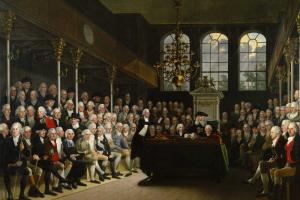1812
Alternative title
Summoned
Assembled
Dissolved
Session
Dates
Long description
During the 1812 Parliament the war against Napoleonic France ended with the allied victory at Waterloo, 18 June 1815; two sitting Members, Sir Thomas Picton and William Ponsonby, were killed in the battle. A rather absurd war with the USA began in June 1812 and ended in December 1814. Lord Castlereagh, the foreign secretary, played a major role in the diplomatic settlement of Europe. His old rival George Canning re-entered the cabinet in 1816. Post-war economic dislocation created problems for the Liverpool ministry, who normally had a secure majority in the Commons but were occasionally defeated when their independent backbench supporters combined with the main Whig opposition on issues of taxation and expenditure. Their legislation to curb perceived sedition, 1817-18, was comfortably carried.
The general election of 1812 ran from 5 Oct. to 6 Nov. Ninety-six constituencies (25 per cent) were contested. The issue of Catholic relief ensured that there was more excitement in Ireland than elsewhere. The most spectacular contest was at Liverpool, where, after an intensive campaign of speechifying on Catholic relief, parliamentary reform and the prospect of war with the USA, the Tories George Canning and Isaac Gascoyne defeated the Whig pair of Henry Brougham and Thomas Creevey. Other prominent Whigs, including Francis Horner, William Lamb, Sir Samuel Romilly, Richard Sheridan and George Tierney, either failed to find a seat or were defeated. Of the 658 men returned, 119 (18 per cent) had no previous parliamentary experience. A further 120 novices came in during the life of the Parliament. The government gained some 30 seats, which produced, in crude terms, a House made up of 419 supporters of government and 239 in opposition.
A ministerial analysis of the new House named 11 Members as personal followers of Canning, and another 12 as adherents of Marquess Wellesley (Wellington’s eldest brother). These two groups were in uneasy alliance, but, after the failure of the Catholic relief bill in late May 1813, Canning disbanded his ‘party’ and severed the connection with Wellesley. This paved the way for his return to the government fold, which took place in March 1816, when he entered the cabinet as president of the India board.
The return of Napoleon to France from Elba inspired some advanced Whigs, notably Samuel Whitbread, to espouse Bonapartism. This offended the more sober members of the party and marked the beginning of the end of the alliance between the Foxite and Grenvillite Whigs as the latter sided with government against deploring the renewal of hostilities. In 1817 the Grenvillites, now under the leadership of Lord Grenville’s brother, the 2nd Marquess of Buckingham, and, in the Commons, Charles Williams Wynn, separated from the main Whig opposition over the suspension of habeas corpus. In the 1818 session Williams Wynn and a few others set themselves up as a ‘third party’.
Whitbread, suffering from a physical disorder of the brain that led him to exaggerate his financial problems, killed himself on 6 July 1815. Other high-profile Whig casualties during this Parliament were their Commons leader George Ponsonby, who suffered a stroke in the chamber on 30 June 1817 and died a week later (the party was leaderless in the Commons for a year); and the brilliant Scotsman and financial pundit Francis Horner, who died of consumption in Italy, aged 39, in February that year.
Studies of voting behaviour in the period 1815-18 have revealed that within the broad two-party system, there was a considerable degree of independence among backbench Members. While the steady supporters of government numbered some 250, and the committed adherents of opposition about 150, there was a ‘government fringe’ of about 78, an ‘opposition fringe’ of 80 or so, and about 100 ‘waverers’, who cast mixed votes. This meant that while the ministry could command a comfortable majority on questions of confidence, as even their most disgruntled backbench friends had no wish to see the Whigs in power, it was vulnerable on specific issues: examples of ministerial defeats in the Commons were on the grant to the duke of Cumberland, 3 July 1815; their proposal to renew the property tax, 18 Mar., and the Irish vice-treasurership, 17 June 1816; and the duke of Clarence’s grant, 15 Apr. 1818.
Only 121 Members (18 per cent of the whole) of a landlord-dominated Commons voted at some point between May 1814 and March 1815 against the government’s enhancement of the corn laws to protect domestic agriculture. A succession of outbreaks of disorder between December 1816 and June 1817 (the Spa Fields riots, the march of the ‘Blanketeers’, and the Pentrich textile riots) prompted the government to suspend habeas corpus and legislate to prevent seditious meeting. Only 112 Members voted for parliamentary reform in at least one of the three divisions on this issue, 11 Feb. and 20 May 1817, and 19 May 1818. Motions to consider Catholic relief were defeated by 228-147 (30 May 1815), 172-141 (21 May 1816) and 245-221 (9 May 1817).
The rejection of the property tax in March 1816 was seen by many (including himself) as a personal triumph for the mercurial Whig lawyer Henry Brougham; but his vicious attack on Court extravagance, 20 Mar. 1816, was thought to have gone too far and ruined the chances of defeating ministers on admiralty expenditure. In 1817 there was a significant piece of legislation in response to distress in the Midlands armaments industry, namely the Poor Employment Act, by which loan commissioners were authorized to advance up to £1,750,000 for public works schemes sanctioned by Parliament. Charles Abbot retired as Speaker on 30 May 1817, and was replaced by Charles Manners Sutton, eldest son of the archbishop of Canterbury, who occupied the Chair until December 1834.

